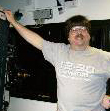|
|
 
|
|
Author
|
Topic: Humidity in the booth
|
|
|
Randy Stankey
Film God

Posts: 6539
From: Erie, Pennsylvania
Registered: Jun 99
|
 posted 02-14-2001 09:42 PM
posted 02-14-2001 09:42 PM




Actually you might need to use BOTH humidifiers AND dehumidifiers in your booth...You want the humidity in your booth to stay in the range of 50-60%. If the levels get too low you'll need to humidify. If the levels get too high then you'll need to DEhumidify. Emptying out the DEhumidifiers? That's just as much a pain in the arse as filling the humidifiers... just in reverse. Do you have a way to hook a water hose to the thing and just run the condensate down the drain? Most dehumidifiers have this option.
There's an old Stephen Wright joke:
"I once got a humidifier and a dehumidifier... I put them together in the same room and let them fight it out."
|
|
|
|
|
|
|
|
John Pytlak
Film God

Posts: 9987
From: Rochester, NY 14650-1922
Registered: Jan 2000
|
 posted 02-15-2001 06:28 AM
posted 02-15-2001 06:28 AM





As Randy noted, Kodak recommends maintaining a relative humidity of 50-60 percent in film handling areas. At this humidity, the processed film will lie nearly flat, with just a bit of beneficial "positive curl".
Excessively dry conditions cause the gelatin emulsion to shrink, such that the film may curl severely. The lack of any moisture also makes the emulsion much less conductive, so static can become more of a problem. At very high humidity, the gelatin emulsion becomes softer, such that it may scratch more easily or build up as hard deposits on the hot projector gate. Damp conditions may actually make the film sticky, and even CAUSE a static problem as the sticky film pulls apart during unwinding. If the humidity is much higher than 60 percent, use a dehumidifier, which removes moisture from the air by condensing it on a refrigerated coil. Most air conditioning systems also remove moisture from the air. Excessive moisture is usually only a problem in the summer, during rainy or very humid weather (e.g., Houston, Miami, or New Orleans in the summer, or the Pacific Northwest almost anytime). If the relative humidity is too low, use an evaporative humidifier to add moisture to the air. These humidifiers blow air through a wet foam pad or fiber filter material, and often can humidify over 10,000 cubic feet of space. Do NOT use an ultrasonic or misting vaporizer --- they actually spray water droplets into the air, leaving behind deposits of the salts and minerals that were in the water (not good for electronic components or film cleanliness). Steam vaporizers that actually boil the water usually don't have much capacity, and use alot of electricity. Always monitor your humidity with an accurate digital humidity gauge or a sling psychometer. Radio Shack, Edmund Scientific, etc. sell these. The cheap analog dial gauges are often inaccurate and difficult to calibrate. Humidity can also be estimated by observing how a short piece of print film hangs --- it should be fairly flat, with just a bit of positive curl. Excessive positive curl indicates excessively dry conditions. Negative curl shows too much moisture. Again, the goal is to maintain between 50 and 60 percent RH. You will find that the humidity will vary with the outside weather, and during the day. Large amounts of air are used by the lamphouses for cooling, and their heat dries out the booth. If possible, cooling air for the lamps should be supplied from an outside source, so the humidified air in the booth doesn't go up the vent. Venting the lamps into the projection room is a BAD idea --- the room will quickly become too hot and dry, and the ozone generated by xenon lamps is not good for your health. Most construction codes require venting the lamps to the outside. Fortunately, the 50-60 percent humidity that is best for film, is also the most comfortable for people. Here is some published information from Kodak:
http://www.kodak.com/country/US/en/motion/programs/student/handbook/physical4.shtml
http://www.kodak.com/country/US/en/motion/newsletters/reel/september99/pointers.shtml
http://www.kodak.com/country/US/en/motion/support/h1/base.shtml
http://www.kodak.com/country/US/en/motion/support/h1/base.shtml#other
------------------
John P. Pytlak, Senior Technical Specialist
Worldwide Technical Services, Entertainment Imaging
Eastman Kodak Company
Research Labs, Building 69, Room 7419
Rochester, New York, 14650-1922 USA
Tel: 716-477-5325 Cell: 716-781-4036 Fax: 716-722-7243
E-Mail: john.pytlak@kodak.com
Web site: http://www.kodak.com/go/motion
|
|
|
|
All times are Central (GMT -6:00)
|
|
Powered by Infopop Corporation
UBB.classicTM
6.3.1.2
The Film-Tech Forums are designed for various members related to the cinema industry to express their opinions, viewpoints and testimonials on various products, services and events based upon speculation, personal knowledge and factual information through use, therefore all views represented here allow no liability upon the publishers of this web site and the owners of said views assume no liability for any ill will resulting from these postings. The posts made here are for educational as well as entertainment purposes and as such anyone viewing this portion of the website must accept these views as statements of the author of that opinion
and agrees to release the authors from any and all liability.
|

 Home
Home
 Products
Products
 Store
Store
 Forum
Forum
 Warehouse
Warehouse
 Contact Us
Contact Us




 Printer-friendly view of this topic
Printer-friendly view of this topic













